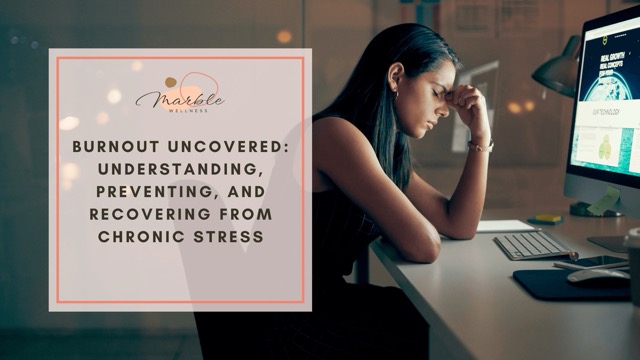Have you been noticing that you’re feeling a bit more stressed and exhausted than usual? Sometimes, when we’re constantly dealing with high levels of stress without adequate rest or support, it can lead to burnout.
Burnout is a state of emotional, physical, and mental exhaustion caused by excessive and prolonged stress. It often involves feelings of being overwhelmed, drained, and unable to meet constant demands. People experiencing burnout may also feel detached or isolated, and their productivity and motivation can significantly decline.
Understanding the Symptoms of Chronic Stress and Exhaustion
Burnout is a gradual process that typically develops over an extended period. Recognizing the early symptoms is crucial for addressing burnout before it escalates. Here are some beginning symptoms to be mindful of:
Chronic Fatigue:
- Feeling consistently tired, both physically and emotionally, despite adequate rest.
- This fatigue may not be relieved by sleep and can persist over an extended period.
- Reduced Performance:
- A decline in professional or personal performance, characterized by decreased efficiency, productivity, or quality of work. Tasks that were once manageable may start to feel overwhelming.
- Cynicism and Detachment:
- Developing a negative or cynical attitude towards work, colleagues, or life in general. Feeling detached from responsibilities and withdrawing emotionally from others.
- Increased Irritability:
- Becoming easily frustrated, irritable, or having a shorter temper than usual. Small inconveniences may provoke strong emotional responses.
- Lack of Motivation:
- Experiencing a notable decrease in motivation and enthusiasm for tasks that were once engaging and fulfilling. Feeling a sense of apathy or indifference.
- Cognitive Impairment:
- Difficulty concentrating, memory lapses, and impaired decision-making. Burnout can impact cognitive functions, making it challenging to focus on tasks or make sound judgments.
- Physical Symptoms:
- Physical manifestations such as headaches, muscle tension, stomach issues, or other unexplained aches and pains. Chronic stress associated with burnout can manifest physically.
- Sleep Disturbances:
- Changes in sleep patterns, including difficulty falling asleep, staying asleep, or experiencing restless nights. Insomnia can be a common early sign of burnout.
- Neglecting Self-Care:
- Neglecting personal needs and self-care routines. Individuals may start to skip meals, ignore exercise, or engage in unhealthy coping mechanisms.
- Social Withdrawal:
- Withdrawing from social interactions and preferring isolation. Burnout can lead to a reduced desire to engage with friends, family, or colleagues.
- Loss of Satisfaction:
- A pervasive sense of dissatisfaction, even in areas of life that were once a source of joy. Activities that were once fulfilling may lose their appeal.
- Perfectionism:
- An increase in perfectionistic tendencies, setting unrealistically high standards for oneself and others. Striving for perfection can contribute to feelings of inadequacy and stress.
It’s important to note that experiencing one or two of these symptoms occasionally does not necessarily indicate burnout. However, if these symptoms persist over an extended period and begin to impact daily functioning, it’s crucial to consider the possibility of burnout. Seeking support, such as talking to a mental health professional or making lifestyle adjustments, can be essential in preventing burnout from escalating. You deserve to feel better!
What are the symptoms of advanced burnout?
Advanced symptoms of burnout represent a more severe and entrenched stage of the condition. It’s crucial to recognize these signs, as they can have significant implications for mental, emotional, and physical well-being. If you or someone you know is experiencing these advanced symptoms, seeking professional help is highly recommended:
- Chronic Physical Symptoms:
- Persistent physical ailments such as headaches, migraines, gastrointestinal issues, or other health problems that don’t have a clear medical explanation.
- Emotional Exhaustion:
- Overwhelming emotional fatigue and depletion. Feeling emotionally drained to the point where it becomes challenging to engage in even simple daily activities.
- Depersonalization:
- Developing a cynical and detached attitude not only toward work but also towards people in general. Individuals experiencing depersonalization may treat colleagues, clients, or loved ones with indifference or even hostility.
- Impaired Concentration and Memory:
- Severe difficulties in concentration and memory. Cognitive functions may be significantly impaired, affecting the ability to perform tasks at work or make decisions.
- Increased Substance Use:
- Turning to substances like alcohol, drugs, or prescription medications as a way to cope with stress and emotional pain. Substance use can become a maladaptive strategy for dealing with burnout.
- Complete Loss of Enjoyment:
- A pervasive sense of joylessness and a complete loss of interest in activities that were once enjoyable. Hobbies, socializing, and other sources of pleasure may no longer provide any satisfaction.
- Work Disengagement:
- Complete disengagement from work responsibilities. Individuals may become indifferent to professional duties, leading to a decline in job performance and satisfaction.
- Compromised Immune System:
- Chronic stress associated with burnout can weaken the immune system, making individuals more susceptible to illnesses and infections.
- Sleep Disorders:
- Advanced burnout can lead to severe sleep disturbances, including insomnia or hypersomnia (excessive sleep). Sleep disorders can exacerbate physical and mental health issues.
- Escapist Behaviors:
- Engaging in escapist behaviors such as excessive TV watching, video gaming, or other activities that serve as a way to avoid facing the stressors contributing to burnout.
- Suicidal Thoughts:
- In severe cases, burnout can contribute to the development of suicidal thoughts. Individuals experiencing such thoughts should seek immediate professional help and support.
- Physical Exhaustion:
- Overwhelming physical fatigue that interferes with daily functioning. Individuals may feel constantly drained and may struggle to perform even basic activities.
Recognizing these advanced symptoms is crucial for taking prompt action. Seeking support from mental health professionals, such as therapists or counselors, is essential. Burnout is a serious condition that can have significant consequences for overall well-being, and early intervention is key to recovery.
Start Burnout Therapy in St. Louis or via Online Therapy in Missouri
Marble Wellness has expert STL therapists to help you find balance and meaning in life, even when you are dealing with burnout and overwhelm. Whether you live in St. Louis, MO for in-person therapy or want to connect virtually with online therapy in Missouri, we can help. Reach out today to get started!
Contact Us!

Additional Counseling Services at Marble Wellness in St. Louis, MO and Chicago, IL
Counseling services are designed to help set you on a path of living a more fulfilled, calm, and happy life.
St. Louis
Our St. Louis team of therapists has a variety of training backgrounds and areas of expertise. We specialize in anxiety, depression, grief, chronic illness, therapy for men, couples, and maternal overwhelm. Our practice also helps new moms with various postpartum concerns, moms in the thick of parenting, and moms with teens. We can also chat from wherever you are in the state with online therapy in Missouri and online therapy in Illinois. No matter where you are in your journey, we would love to support you.
Chicago
Our Chicago team of therapists offers a wide range of mental health services to help our clients through the different challenges and hurdles in their lives. In addition to anxiety, depression, grief, therapy for men, and maternal overwhelm, we specialize in professional burnout, therapy for breakups, and love partnering with working moms.



